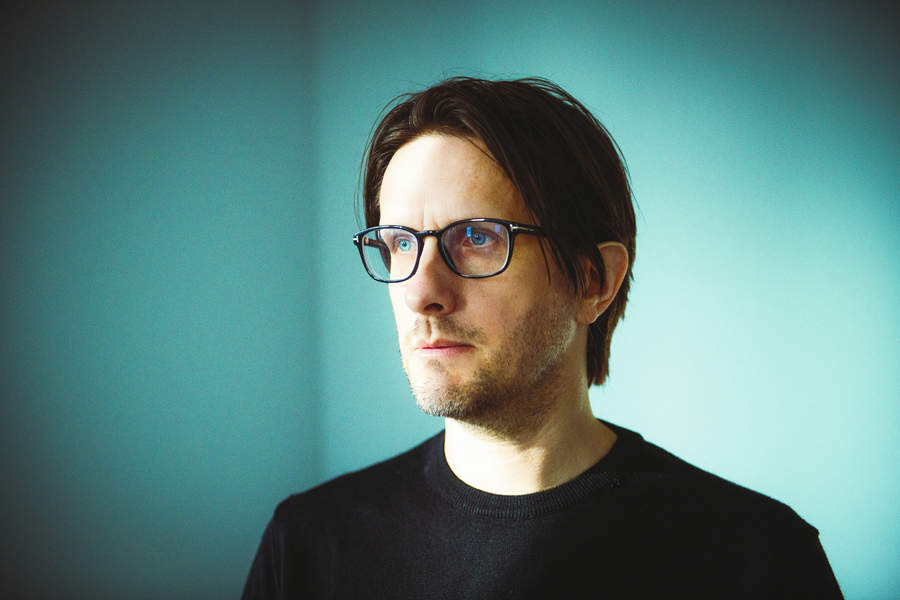
This interview was conducted to mark the 300th issue of Classic Rock magazine, which launched in 1998. The anniversary issue is available to purchase online, and also features interviews with Gene Simmons, Def Leppard, Alice Cooper, Geddy Lee, Justin Hawkins, Rick Nielsen, Slash and many more.
Despite having released five albums in a 12-year career, Porcupine Tree were only on the music scene’s periphery when Classic Rock introduced them, in issue number four.
In what turned out a rare outburst, during a debate about the boundaries of progressive rock the usually media-savvy Steven Wilson bridled at being compared with Yes, declaring their recent output “absolute fucking excrement”.
His attitude, though, has always been that new ground must be broken with each creative project. And that refusal to merely give people “more of they want” has led to a stellar solo career with six albums to date. Having unexpectedly reunited, later this year Porcupine Tree release a new album, titled Closure/ Continuation – their first in more than a decade.

What are your memories of Classic Rock’s launch way back in the autumn of 1998?
Well, a little later I remember coming to an awards ceremony, when Porcupine Tree won Album Of The Year for Fear Of A Blank Planet [in 2007], which was very, very posh. There were so many musical celebrities, it was amazing.
Where were you in your life in 1998?
Porcupine Tree were still on a little label called Delerium Records. Britpop would still have been big. When you think about it, in some ways it’s almost like Classic Rock has presided over the whole era of rock music gradually disappearing from the mainstream – not that that’s necessarily a bad thing.
Didn’t Classic Rock also reinvigorate the scene for rock fans of a certain age who were no longer being catered for?
In some ways that’s what I’m saying. When something disappears from the mainstream, a magazine like Classic Rock becomes absolutely essential – it’s the bible. You see that with Prog magazine, too. Those titles become magnets. So your timing was perfect. You gave the scene a lifeline.
Classic Rock was one of the first high-street magazines to cover Porcupine Tree, and you’ve also been a reviewer for us. Do you feel a tie to what we’re doing?
I do, because I’ve always been outside of the mainstream myself. It’s where I continue to be. Without magazines like yours it would have been very hard for me to reach the point I’m at now.
With your solo career continuing to advance so spectacularly, what was the thought process behind putting Porcupine Tree back together?
But for lockdown, it probably wouldn’t have happened. These songs were written over the last ten or eleven years, and we always intended to finish them. My solo career and Gavin’s [Harrison, drummer] work with King Crimson sidelined that plan, but lockdown gave us the window of opportunity to knuckle down and do it.
Can you give us a flavour of Closure/Continuation, the band’s first album in twelve years, which is due in June?
It’s very hard for me to step back and be objective, but it sounds like a quintessential Porcupine Tree record – albeit one that could only have been made in 2021. I know that’s vague, but it’s the best I can do.
The passing decades have brought you a parallel career in remixing classic albums across multiple genres in 5.1 sound. Could you pick out a favourite or two?
There are so many, but the ones I’m most proud of are the ones to which I made the biggest difference. Some records didn’t sonically match up to the artistry involved. I really felt I was able to lay the shine on Jethro Tull’s Aqualung, which was plagued by technical problems. I’m also proud of my work with XTC and Gentle Giant, because both bands are so underrated.
What are your thoughts on the rise of the Deluxe Edition reissue/ remix – selling people stuff that they already own?
It’s a bit of a knotty one. The whole culture of the Deluxe Edition is probably the last hurrah of records. People are now buying records for maybe the third or fourth time, only now it’s a 20-CD box with the demos, B-sides and alternative versions. I can’t think of anything more boring. I’d rather hear new music. We’ve become archeologists, but for those people that do want those products with which I’m involved, if it isn’t an oxymoron, I feel duty-bound to do the best job I can.
We must wait until autumn to see you on stage again, this time with Porcupine Tree. Did you miss it?
I’ll let you know when it happens. I think I did. For a while I enjoyed the break, but I feel like I’m about ready to go back.
Your book Limited Edition Of One: How to Succeed In The Music Industry Without Being Part Of The Mainstream, begins with you standing on stage at the Royal Albert Hall in 2010, knowing that it would be the last show from Porcupine Tree – but without having told management, your record label or your bandmates. Your explanation is poignant, but basically it was that the band had begun “treading water”, as you put it.
One of the recurring themes in the book is of not wanting to repeat myself, and of confronting the expectations of the fan base. The problem with having a professional brand is that it’s very easy to get locked into a pattern of giving people more of what they want. I say in the book that I never planned for it [Porcupine Tree] to be over for so long, or even permanently, but I did know that for a while I needed to go on and do something different.
In another eight years, God-willing, Classic Rock will reach issue number four hundred. Do you expect to be still making music then?
I do. I can’t really do anything else. For all of my disappointment with the way that the industry is going – in a very superficial way, music is becoming less valuable in people’s lives and it no longer has the same cultural impact – at the same time there are still some people who remain completely passionate about it, and thanks to magazines like Classic Rock a completely evangelistic sub-culture has been born. Great new music will be made, and we will still need magazines like Classic Rock to find out about it.
Porcupine Tree's Closure/Continuation is released on June 24.

